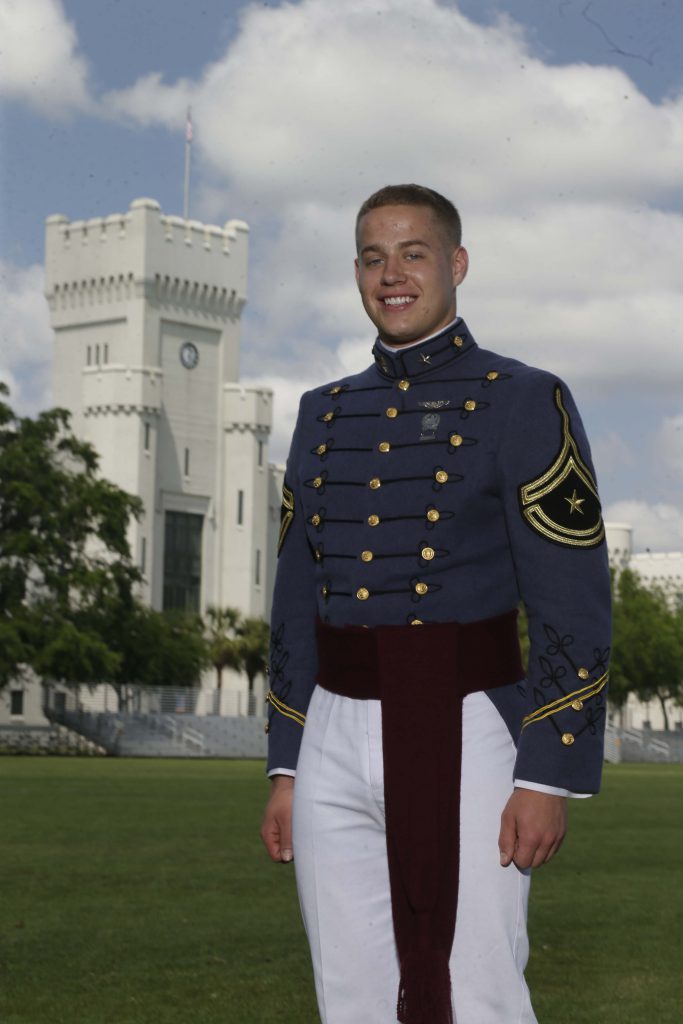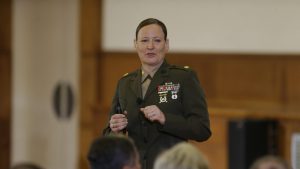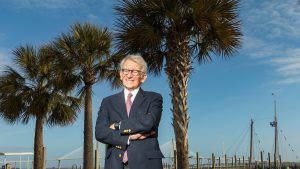As seen in The Citadel Magazine, by Cadet Dillon Graham
ALL BIOLOGY MAJORS know that two interconnected biopolymer strands coil around each other to form a double helix that makes up each deoxyribonucleic acid molecule. Embedded in that DNA molecule is the individual genetic code that makes us all unique individuals. Like the double helix, all cadets are defined by unique experiences that identify who they are. It’s the little things—company rosters, academic majors, faculty schedules, roommate assignments, leadership selection—all seemingly random personal encounters that make up each cadet’s individual experience. The experiences I have had profoundly impacted my development. The people, the opportunities and the adversity all changed me in ways greater than I could have imagined.
Years before I decided to attend The Citadel, I didn’t know my experiences growing up would have any bearing on my college decision, but remarkably, they have. In 2010, when I was in the 8th grade, my first exposure to The Citadel was by a successful orthopedic surgeon. Dr. William Mills, the father of a friend of mine, was a member of the Class of 1981. His commitment to service and his willingness to help his patients in any way he could inspired me to follow a similar path in my college education.
As a young student intent on eventually attending medical school, I was motivated by his example to do well, succeed academically and attend a respected college. In high school, a Delta Company cadet, Hunter Brandon, ’16, became a mentor to me. His advice on exercise and books to read had a profound impact.
“If you choose to go to The Citadel,” he said, “it will be the greatest decision of your life.”
One day in the gym, he pushed me harder than I thought possible. I had worked so hard to keep up with him that I physically could not work any harder, yet his intensity and his resolve were so motivating that I kept working.
“Think about your goals, Dillon,” he said. “Your hard work will separate you from everyone else at The Citadel.”
Those words stuck with me, and from that point on, I was committed to becoming a member of the Corps of Cadets. In the military environment, I realized, I would be immersed in an environment that would constantly push me to reach my full potential. On the night before matriculation, the air in Mt. Pleasant was typical of a Lowcountry August night—warm and humid with the occasional respite of a breeze blowing off the ocean. On a pull-out mattress at the Holiday Inn, I slept fitfully. I knew this was a big step in my life, and I was both excited and nervous about the challenge ahead of me.
The next day I sat in the backseat of my parents’ car as the traffic slowly snaked around the Holliday Alumni Center until it was time for me to check in. When a neatly dressed cadet handed me a packet of information, including my company and battalion assignment, I thought, “I’m just another piece of the puzzle,” and I quickly realized that this was no longer about me. To my surprise, I was dropped off at Murray Barracks, where I became a member of Delta Company. Hunter Brandon and Dr. Mills were both from Delta Company, and Dr. Mills’ son, Luke Mills, was also matriculating that day in Delta Company. For a second, I thought I might be getting a break.
As soon as I approached the battalion, I was greeted by a group of parents eager to assist me in moving to my new room. “Tuck your shirt in and pull up your socks,” one of them advised me.
“They won’t get on you as much if you look good.” Showing up in basketball shorts and a bright-red Rogue Fitness t-shirt was probably not my best idea. Inside the gate, the atmosphere was charged with noise and intensity, and I got a rush. At the Delta Company letter, I was confronted by an intimidating cadet.
“This guy is the real deal,” I thought to myself. Even though he was only a year older than I was, there was a world of difference between us. I was ordered around the quad to pick up basic issue items and constantly corrected for not saying “sir” and for making eye contact with the cadre. I had only been there a few minutes, and somehow I was already flustered and nervous. All of the training and mental preparation I had done before arriving seemed useless.
I felt hopeless and at the mercy of my cadre. When I got to my room, I looked at the name cards on the door and noticed that, coincidence or not, I would be rooming with Luke. The next minute, he arrived with all of his gear just as flustered as I was, and I felt an immediate commitment to something bigger. All of my classmates were going through similar challenges, and we would make it through this together. We changed into our physical training uniforms, strapped on our camelbacks and wore our identification bags as we were formally introduced to our cadre for the first time. The remainder of training week is a blur.
The long days ran together, the heat was severe, the sleep was slim and training was intense. I got a haircut, made more close friends in a week than I had in years and became completely dedicated to doing everything I could to be successful and help others do the same. Every morning started off with a cleaning detail. We reported behind the letter on fourth division, the top level where we all lived, to clean the barracks before morning formation. And every morning, Mr. Dunphy, our formidable cadre platoon sergeant, hot coffee in hand, greeted us, “Good morning, knobbies.”
In unison, we replied, “Sir, good morning, sir.” This short exchange was followed by an explanation about what we were doing right, what we were doing wrong and what we needed to be doing to move forward.
To my classmates and me, Mr. Dunphy was a sterling example of the cadet we should all aspire to be. His personal appearance was flawless, and he was clever, smart and stern. We all respected him without question. On a daily basis he motivated me to go outside of my comfort zone and search for opportunities, study, become more physically fit and help others in any way I could. Every cadet needs this kind of positive influence in knob life. Without great leadership, we are dropped into a system with no guidance or light to push us in the proper direction. Mr. Dunphy was there for us, and he wanted nothing more than to see us succeed. Christmas was the toughest part of the year for me. I went home to relax and enjoy the holiday season with friends and family.
My friend, Hunter, had always told me that trips home would never again be the same. “You will always have different values than the people you used to be close with,” he said, “and that will distance you from the ones you were close to before leaving.” Without a doubt, he was right. This was not a bad thing, though. I was now dedicated to something larger than myself. I was committed to making myself better in order to make myself more capable of succeeding in the challenging system I was now a part of. I was motivated to help others and set a positive example for my class, so I worked as hard as I could. I ran, lifted weights, read books and got rested up for second semester. Despite this preparation, I was not ready to go back to school in January.
Once again, I left my family and my girlfriend. With butterflies in my stomach, I returned to The Citadel and finished the year. Through a combination of friends, mentors and challenges, I succeeded as a knob and made the rank of company clerk for my first semester as a sophomore. As a rank holder, I was responsible for being the leader of my class and setting a good example for everyone to follow. My sophomore year was one of opportunities, and I began doing academic research, seeking out mentors and anything I could to maximize my experience. My second-semester roommate, Ivan Dingle, became my best friend. Together, we explored academic life, served as presidential aides and motivated one another. The biggest lesson I learned that year was to take advantage of opportunities, no matter what they are. The independence of the year helped me to understand the duty to act independently.
The year was punctuated by a biology trip to Panama, an experience so rich and intense that it changed my cultural perspective and piqued my interest in science. At this writing, I have just finished my junior year, which was a juggling act for me. My extracurricular activities ranged from participation in the Pre-Health Society to Junior Sword Arch and rigorous Bond Volunteer Aspirant training to join the Summerall Guards. It was the Junior Sword Arch that intensified my appreciation for excellence and a commitment to selflessness. Kevin MacDonald, the 2016-2017 regimental commander, was the commander of the 2017 Junior Sword Arch, which performs during Ring Ceremony on Parents’ Weekend to honor the senior class.
The process to become a member is an enormous commitment, but I was dedicated to being accepted. I was still attracted to the discipline of knob year, and this process in a way was similar. We were taught the importance of attention to detail, respect, honor of tradition and heritage, professionalism and physical fitness. Only the best cadets are selected for this group, and I longed to be one. Kevin exemplified everything that I wanted to be as a junior and senior cadet. He had risen through the ranks.
He was a highly respected classmate, and now he commanded the entire regiment. I looked up to him and modeled his behavior. Throughout the process, I always put maximum effort into preparing my training uniform, helping my classmates prepare and performing during the training sessions. Kevin’s example was a constant motivation to become the best that I could be. My hard work paid off. I was named commander of the Junior Sword Arch by my peers and had the challenge of preparing our platoon for the performance on Parents’ Weekend.
 At the conclusion of Junior Sword Arch, I emerged with the experience of being dedicated to a mission that is solely selfless. The hours of dedicated practice that were put into this organization were solely for one performance to receive little acknowledgment and simply to honor those before us. It was a rewarding experience. I applied this same effort to my cadet duties and activities for the rest of the year, staying in contact with Kevin and my other mentors. In the spring, I learned that I would follow Kevin’s footsteps as the 2017-2018 regimental commander. Before coming through the symbolic Lesesne Gate, I never dreamed of accomplishing anything close to what I have since my arrival. Sure, I read The Lords of Discipline and Sword Drill in high school, and I pictured myself as another cadet going through the system and emerging as a principled leader, but I never envisioned the minute details—the people, friends, memories, muggy days, cold nights, rainy days, haircuts, lack of sleep and extraordinary motivation that would ultimately mold me into the cadet I am today. DNA is remarkably similar in this way.
At the conclusion of Junior Sword Arch, I emerged with the experience of being dedicated to a mission that is solely selfless. The hours of dedicated practice that were put into this organization were solely for one performance to receive little acknowledgment and simply to honor those before us. It was a rewarding experience. I applied this same effort to my cadet duties and activities for the rest of the year, staying in contact with Kevin and my other mentors. In the spring, I learned that I would follow Kevin’s footsteps as the 2017-2018 regimental commander. Before coming through the symbolic Lesesne Gate, I never dreamed of accomplishing anything close to what I have since my arrival. Sure, I read The Lords of Discipline and Sword Drill in high school, and I pictured myself as another cadet going through the system and emerging as a principled leader, but I never envisioned the minute details—the people, friends, memories, muggy days, cold nights, rainy days, haircuts, lack of sleep and extraordinary motivation that would ultimately mold me into the cadet I am today. DNA is remarkably similar in this way.
We will never know about all of the individual nucleotides that code for the genes that make us who we are, but we should all take the time to reflect upon the little things that so eloquently paint the picture of the type of person we are and will become in the years to come. In the grand scheme of things, the double helix molecule so beautifully comes together that we often fail to appreciate its monomers. Successes and accomplishments are far from a product of our own efforts. The profound influence of others and outside experiences shape us into who we are. The perspective to see beyond the cloudy days, the early morning physical training, formations, uniform inspections and regulations has an impact much greater than what is visible on the surface.
The heritage of The Citadel is profound and beautiful, and it is the duty of the Corps of Cadets to carry the torch of this legacy in the right direction.
Cadet Colonel Dillon Graham is a senior from Myrtle Beach. Currently serving as the 2017-2018 regimental commander, he is a biology major who plans to attend medical school upon graduation.

 Resilience in the Face of Adversity
Resilience in the Face of Adversity The Promise of Something Great
The Promise of Something Great